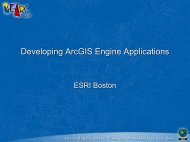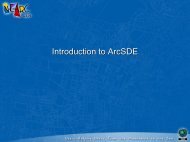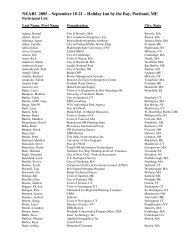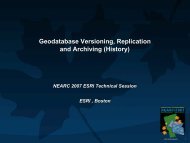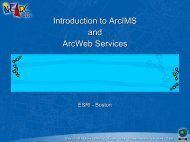GIS EDUCATORS DAY - Northeast Arc Users Group
GIS EDUCATORS DAY - Northeast Arc Users Group
GIS EDUCATORS DAY - Northeast Arc Users Group
You also want an ePaper? Increase the reach of your titles
YUMPU automatically turns print PDFs into web optimized ePapers that Google loves.
G I S E D U C A T O R S D A Y<br />
S u n d a y , N o v e m b e r 1 1<br />
Agenda-at-a-Glance<br />
9:00 a.m. –<br />
9:30 a.m.<br />
9:00 a.m. –<br />
9:30 a.m.<br />
9:30 a.m. –<br />
9:45 a.m.<br />
Meeting<br />
Room<br />
10:00 a.m. –<br />
11:00 a.m.<br />
Registration – Sidewalk Lobby Level<br />
Continental Breakfast – Third Floor Area<br />
Welcome Remarks & Introduction/ Overview of the Day – Auditorium<br />
HANDS-ON WORKSHOPS ORAL PRESENTATIONS ORAL PRESENTATIONS<br />
Katherine Aldridge Tucker Room Auditorium Washington Street Room<br />
Introduction to Web Mapping<br />
1. Using <strong>GIS</strong> to Study the Great<br />
Bangor Fire of 1911<br />
2. Production & Consumption:<br />
The Give and Take of Energy-<br />
A Lesson Using <strong>Arc</strong><strong>GIS</strong> Online<br />
1. Enhancing Engagement in<br />
Geospatial Topics Through<br />
Authentic Learning<br />
2. <strong>GIS</strong> and Service Learning –<br />
An Almost Perfect Marriage<br />
HANDS-ON WORKSHOPS PANEL PRESENTATIONS PANEL PRESENTATIONS<br />
11:10 a.m. –<br />
12:10 p.m.<br />
<strong>Arc</strong><strong>GIS</strong> Online: Personal vs.<br />
Organization Accounts<br />
<strong>Arc</strong><strong>GIS</strong> Online Activities for K12<br />
Thinking About Spatial Literacy<br />
in Education<br />
12:15 p.m. –<br />
12:45 p.m.<br />
12:45 p.m. –<br />
1:30 p.m.<br />
Lunch – Third Floor Area<br />
Keynote Address – Auditorium<br />
Dr. Matthew Bampton, University of Southern Maine<br />
Spatial Adventures: Undergraduate Research Experiences in the Field and Laboratory<br />
HANDS-ON WORKSHOPS PANEL PRESENTATIONS ORAL PRESENTATIONS<br />
1:30 p.m. –<br />
2:30 p.m.<br />
Adding GPS Data to<br />
<strong>Arc</strong><strong>GIS</strong> Online<br />
The Road to a K-12 Statewide<br />
Esri License in New Hampshire<br />
1. Involving Undergraduate<br />
Students in <strong>GIS</strong> Research: The<br />
Bringing Broadband to North<br />
Central MA Project<br />
2:40 p.m. –<br />
3:40 p.m.<br />
3:45 p.m. –<br />
4:00 p.m.<br />
Publishing Content to<br />
<strong>Arc</strong><strong>GIS</strong> Online<br />
<strong>GIS</strong> Educators Day Wrap-up & Prizes – Auditorium<br />
2. <strong>GIS</strong> and a Sense of Place<br />
1. 1. Living in the <strong>GIS</strong> World as a<br />
MAC User<br />
What Do Employers Want<br />
The 21 st Century Geospatial<br />
2. 2. Intra-university Collaborations:<br />
Workforce<br />
An Experiment in Classroom-<br />
Facilities Cooperation<br />
Page | 1
SESSION ABSTRACTS<br />
Hands-on Workshops<br />
Introduction to Web Mapping<br />
Lyn Malone, WORLD VIEWS Spatial Technologies for Education<br />
Using <strong>Arc</strong><strong>GIS</strong> Online, anyone can easily create high-quality, interactive maps that can be accessed from web<br />
browsers, mobile devices, e-mail, and popular social media sites. This workshop will walk you through the processes<br />
of finding free data and maps in <strong>Arc</strong><strong>GIS</strong> Online, creating interactive maps to suit your needs, saving your maps,<br />
and sharing maps and data with others.<br />
<strong>Arc</strong><strong>GIS</strong> Online: Personal vs. Organization Accounts<br />
Charlie Fitzpatrick, Esri Schools Program Manager<br />
How do <strong>Arc</strong><strong>GIS</strong> Online’s new subscription accounts for organizations differ from the free personal accounts<br />
Workshop participants will explore, practice, and compare the functionality and capabilities of each mode to<br />
better understand available alternatives for meeting their own mapping needs.<br />
Adding GPS Data to <strong>Arc</strong><strong>GIS</strong> Online<br />
Tora Johnson, Micheal Oram – University of Maine at Machias<br />
In this hands-on workshop, participants will learn how to collect data in the field using GPS receivers and map the<br />
data on <strong>Arc</strong><strong>GIS</strong> Online. The process is easy and works with Mac or Windows operating systems. We'll offer<br />
instructions, tips and tricks, and online resources to help you get started collecting field data with your students.<br />
Publishing Content to <strong>Arc</strong><strong>GIS</strong> Online<br />
Charlie Fitzpatrick, Esri Schools Program Manager<br />
Esri is expanding <strong>Arc</strong><strong>GIS</strong> Online to give organizations the ability to manage their geospatial content and publish<br />
their maps, apps, data, and hosted services in Esri's cloud infrastructure. In this workshop, you will learn how to<br />
publish maps and data directly to <strong>Arc</strong><strong>GIS</strong> Online, then access those map services from different components of the<br />
<strong>Arc</strong><strong>GIS</strong> system. The presenter will walk you through the steps to publish a map or feature service, enable and<br />
disable editing on a feature service, and create web applications with <strong>Arc</strong><strong>GIS</strong> Online templates.<br />
Oral Presentations<br />
Using <strong>GIS</strong> to Study the Great Bangor Fire of 1911<br />
Margaret Chernosky, Bangor High School<br />
Time travel to explore past landscapes with <strong>GIS</strong>! Last spring, Bangor High School’s <strong>GIS</strong> in Geography class shared<br />
their <strong>GIS</strong> study of the Great Fire of 1911 with the public on the 100 th anniversary of the fire. This inferno destroyed 6<br />
churches, 100 businesses 267 homes and many of the city’s public institutions. Using the census data of 1910 and fire<br />
insurance maps of 1908, the students were able to recreate the city before and after the fire. In this presentation,<br />
Margaret will show you how to prepare a geohistorical project for your own classroom using local data.<br />
Production & Consumption: The Give and Take of Energy – A Lesson Using <strong>Arc</strong><strong>GIS</strong> Online<br />
Catherine Kropp, Washington Academy<br />
Learn about global energy with this demonstration of the spatial analysis tools (graphs, summaries, color ramps, and<br />
pop-up windows) available in <strong>Arc</strong><strong>GIS</strong> Explorer Online. Analyze the global consumption and production of fossil fuels<br />
(oil, coal, natural gas), as well as the consumption of hydroelectric and nuclear energy, while developing an<br />
understanding of the classroom applications of online <strong>GIS</strong> for grades 7-12. Lesson materials will be available.<br />
Enhancing Engagement in Geospatial Topics Through Authentic Learning<br />
Adena Schutzberg, ABS Consulting <strong>Group</strong>, Inc.<br />
A class of eighth graders pointed to authentic learning as one way to keep them engaged in class. They probably<br />
didn’t use that term, but knew that learning skills and ideas through “here and now” real world problems was far<br />
more interesting than made up or disconnected examples. How can we do that with geography and <strong>GIS</strong> *beyond*<br />
doing a local <strong>GIS</strong> project This session provides examples and techniques to take advantage of real world goings<br />
on to enhance engagement. We’ll look at current tech news, online maps, the media, the local neighborhood and<br />
other real world sources and situations to develop engaging activities as core or supporting tools in teaching<br />
geography, <strong>GIS</strong> and related skills and ideas.<br />
Page | 2
<strong>GIS</strong> and Service Learning – An Almost Perfect Marriage<br />
Robb Freeman, Eastern Maine Community College<br />
In an effort to provide students with practical <strong>GIS</strong> work experience, Eastern Maine Community College partnered<br />
with the Mount Desert Island Biological Laboratory (MDIBL) and the Frenchman Bay Consortium to assist in creating<br />
an atlas of Frenchman Bay. After a field trip to Frenchman Bay and MDIBL, students worked with the client (primarily<br />
MDIBL scientists) to create maps of various aspects of Frenchman Bay’s human and natural environment. Students<br />
gained valuable experience through this course and made significant contributions toward this important project.<br />
In addition to highlighting some student work, this presentation will address identification of a suitable service<br />
learning partner, and some of the successes, challenges, and lessons learned that may apply to service learning<br />
efforts in general.<br />
Involving Undergraduate Students in <strong>GIS</strong> Research: The Bringing Broadband to North Central MA Project<br />
Jane Xinxin Zhang, Fitchburg State University<br />
Many cities and towns in North Central Massachusetts have limited broadband internet access. The purpose of the<br />
Bringing Broadband to North Central Massachusetts project is to provide these communities a basic broadband<br />
availability and usages analysis. Undergrad students contributed in all three phases of the project: data collection<br />
using smart phone GPS in phase one; broadband data organization in a <strong>GIS</strong> through an off-campus internship in<br />
phase two; and lastly <strong>GIS</strong> analysis and mapping on broadband, demographic, and business information in phase<br />
three. This project demonstrated that with institutional support undergrad students could contribute greatly in a<br />
research project that not only benefited the local communities, but also led to greater opportunities such as jobs<br />
and grad schools.<br />
<strong>GIS</strong> and a Sense of Place<br />
Glenn Hazelton, <strong>Northeast</strong>ern University<br />
Near real time geo-referenced locations are now easy to add to <strong>GIS</strong> web maps like <strong>Arc</strong>gis.com. We have also<br />
witnessed the rise of geo-referenced Twitter comments in environmental emergency mapping efforts. This<br />
presentation will explore how we might expand the content of these data by embracing the vernacular used to<br />
describe our “Sense of Place.”<br />
Living in the <strong>GIS</strong> World as a Mac User<br />
Shane Bradt, Geospatial Extension Specialist, UNH Cooperative Extension<br />
Until recently, being both a Mac user and a <strong>GIS</strong> user was quite difficult, and at times, frustrating enough<br />
to be preventative. Over the past few years, however, more and more options for using <strong>GIS</strong> on a Mac<br />
have appeared. New <strong>GIS</strong> software has emerged that is Mac OS X native, and plenty of <strong>GIS</strong> options now<br />
exist online, completely removed from the Mac/PC operating system debate. In addition, with Intelbased<br />
chips and more horsepower, Macs are much more capable of running Windows software<br />
through a variety of virtualization techniques. This presentation will focus on the range of options for<br />
using <strong>GIS</strong> on a Mac, and will foster discussion on the best approaches for working with <strong>GIS</strong> on Macs in<br />
the classroom.<br />
Intra-university Collaborations: an Experiment in Classroom – Facilities Cooperation<br />
Paula Kay Lazrus, St. John's University; Raelynne Lee, St. John's University<br />
As part of its desire to participate in the TreeCampus USA program, the Sustainability Office at St John's University<br />
proposed an Academic Service Learning (ASL) project to the school's ASL office. The project was adopted by a<br />
faculty member teaching a required freshman seminar with a mandatory ASL component. The challenge entails<br />
mapping all the campus trees with students who have no <strong>GIS</strong> background, at a school with no dedicated <strong>GIS</strong><br />
software. Using open source software and landscape planning documents, students started this project in the Fall<br />
of 2012. While still a work in progress we report on how this collaborative project between St. John’s University<br />
Sustainability Department, St. John’s Facilities and three academic classes provide rich experiences for the<br />
students, faculty and administrators. The <strong>GIS</strong> Tree Mapping project will lead to a student monitored tree<br />
maintenance plan for all trees on campus following the Organic Soils Management of university grounds. Each tree<br />
will have a data point including tree identification as well as needs such as spraying compost tea or pruning limbs.<br />
Page | 3
Panel Presentations<br />
<strong>Arc</strong><strong>GIS</strong> Online Activities for K12<br />
Julianne Taylor, Katie Hackley, Michael Oram – University of Maine at Machias<br />
Learn how <strong>Arc</strong><strong>GIS</strong> Online can be used in the K12 classroom to address learning standards with fun, hands-on and<br />
inquiry-based activities. Panelists will share resources and instructions for exploring natural disasters, tricky ocean<br />
predators, US census, and more. Materials, maps, and data sets will be available at the http://gis.maine.edu<br />
website after the conference.<br />
Thinking About Spatial Literacy in Education<br />
Sharron Macklin, Williams College; Carol Cady, St. Lawrence University; Jon Caris, Smith College;<br />
Kathleen Dunckel, Unity College<br />
Before promoting the use of <strong>GIS</strong> (Geographic Information Systems/Science) in the curriculum, consideration needs<br />
to be given to whether today’s students have the necessary foundation to work with spatial concepts. Frank<br />
discussions of the current lack of spatial literacy in all levels of education can shed light on our future path. This<br />
discussion panel will focus on the perceptions of “the state” of spatial literacy on campuses rather than what is<br />
being done to promote literacy. Are students arriving on campus prepared for spatial tasks How might we assess<br />
student spatial literacy Would those in higher education like to see change in the K-12 curriculum to increase this<br />
form of literacy Does a low level of spatial literacy impact teaching of real critical thinking skills Where do we go<br />
from here<br />
The Road to a K-12 Statewide Esri License in New Hampshire<br />
Shane Bradt Geospatial Extension Specialist, UNH Cooperative Extension; Ina Ahern, Plymouth Regional<br />
High School; Bob Woolner, Hopkinton Middle/High School; Scott Semmens, Hopkinton Middle/High<br />
School; Judy Tumosa, New Hampshire Fish and Game Department<br />
Starting this fall, students in New Hampshire schools will have the chance to learn and apply geospatial concepts<br />
using Esri software thanks to a statewide K-12 site license signed in the summer of 2012. The agreement was made<br />
possible through a collaborative effort of the New Hampshire State Department of Education, New Hampshire<br />
Geographic Alliance, New Hampshire Fish and Game Department, UNH Cooperative Extension, and key <strong>GIS</strong> K-12<br />
educators throughout the state. A team of New Hampshire Education <strong>GIS</strong> Specialists (NHEd<strong>GIS</strong>) has been formed to<br />
manage the account and provide professional development to increase the adoption of geospatial technologybased<br />
education in New Hampshire schools and youth groups. During this presentation, key participants of<br />
NHEd<strong>GIS</strong> will reflect on the current state of <strong>GIS</strong> education in New Hampshire, share lessons learned on the road to<br />
the statewide Esri site license, and detail site license rollout plans for the 2012-13 school year.<br />
What Do Employers Want The 21 st Century Geospatial Workforce<br />
Patrick Cunningham, Blue Marble Geographics; Stu Rich, Pen Bay Solutions; Judy Colby-George, Spatial<br />
Alternatives; Nate Kane, Maine Department of Transportation<br />
What skills and knowledge do students need to be competitive in the workforce today and in the future Employers<br />
who hire <strong>GIS</strong> professionals in a variety of capacities will discuss experiences in hiring geospatial professionals, what<br />
they look for, and future trends for <strong>GIS</strong> in the workforce. They will also answer your questions about <strong>GIS</strong> in the<br />
workforce.<br />
Page | 4





